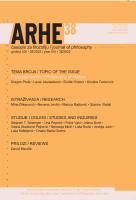Revolucija volje za život u kapitalizmu
Revolution of the Will for Life in Capitalism
Author(s): Vesna R. Stanković PejnovićSubject(s): Political Philosophy, Social Philosophy, Contemporary Philosophy, Structuralism and Post-Structuralism, Marxism
Published by: Филозофски факултет, Универзитет у Новом Саду
Keywords: Nietzsche; Marx; Deleuze; Guattari; revolution; life;
Summary/Abstract: The paper proves that Nietzsche's will to live as the will to power, Marx's free work as an expression of life, and Deleuze's concept of desire as the will to power is the basis for the revolution of the will to live in capitalism Nietzsche advocates an educational and cultural revolution as a way out of the alienated world in which people are used as objects. By revolution, Marx does not mean only a political or economic change, or even a worldview change, but primarily a "radical change in man and society" in terms of opinion. The revolution is aimed at the abolition of all exploitation, but also the full realization, the highest form, and essence of practice as a free creative activity. Marx stands for a permanent revolution of the whole as a circular process of the absolute idea, the process of self-production mediated through all the special ways of producing objects, and the world as a whole is realized. Deleuze, in collaboration with Guattari, combines the opinions of Nietzsche and Marx and strives to develop a policy appropriate to the complexity of life, pointing out that capitalism is repressive in its uncontrolled imposition and accumulation of desires with the danger of equating man and machine. They advocate experimentation-life, the creation of a "new country" as a project that cannot be reduced to a political solution as the production of the real, the creation of life, through active, positive lines of escape because they open up desire. Desire, which according to Nietzsche is the will to power, is in itself a revolutionary process. The process of desire is joy, and its process takes place through deterritorialization as a line of escape as action because there is nothing more active than escape as "the encounter between two realms."
Journal: Arhe
- Issue Year: 2022
- Issue No: 38
- Page Range: 269-296
- Page Count: 28
- Language: Serbian

